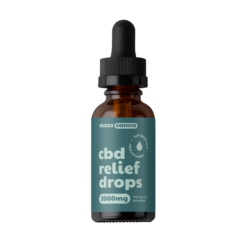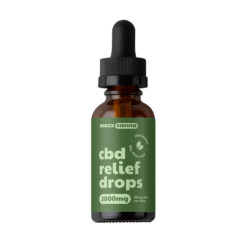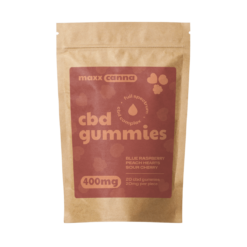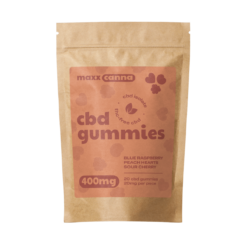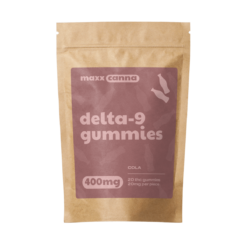As people are becoming more aware of their health and declining the use of Allopathic medicines for their regular pain and wellness, CBD has come into popularity. This natural bliss cannabidiol (CBD) has emerged as a popular option for individuals seeking natural support for various concerns. However, understanding the different types of CBD products can be confusing, especially when encountering terms like “CBD isolate” and “full-spectrum CBD.”
Knowing the key distinctions between these two forms is crucial for making informed choices that align with your needs and preferences. So, if you are also confused and won’t be able to choose between CBD isolate and full-spectrum isolate, this article can assist you in getting clarity.
What is CBD Isolate?
CBD isolate is the purest form of cannabidiol (CBD) available. Isolate CBD is extracted from hemp plants and undergoes a refining process to remove all other plant compounds to get the purest form of Cannaninoidal. This results in a crystalline powder or concentrated oil, almost pure CBD. Iisolate CBD usually contains around 99% of CBD and is 100% free from compounds that create “High” effects, like other cannabinoids, THC, terpenes, and flavonoids.
Benefits of CBD Isolate
1. Precise Dosing:
Since it’s pure CBD, isolate offers the most precise and controlled way to determine your dosage. This can be beneficial for individuals seeking predictable and consistent effects. However, isolated CBD is the best option for starting your journey if you are a beginner.
2. No Psychoactive Effects:
As it contains no THC, CBD isolate is guaranteed not to produce any psychoactive effects. This makes isolate CBD a suitable option for individuals who do not want “high” effects associated with THC.
3. Flavorless and Odorless:
Removing terpenes and flavonoids results in a neutral taste and smell, making it more suitable for individuals who do not like the earthy flavor of full-spectrum CBD oil.
4. Lower Risk of Interactions:
The absence of other cannabinoids and plant materials potentially reduces the risk of interactions with certain medications. However, consulting your healthcare professional before using CBD isolate is still crucial if you are undergoing through medication.
5. Variety of Consumption Methods:
CBD isolate oil can be easily incorporated into various products like edibles, vapes, or topicals, offering users more flexibility in choosing a preferred method of consumption.
What is Full-Spectrum CBD?
Including CBD, full- spectrum CBD contains terense and flavonoids. These aromatic compounds, also found in full-spectrum CBD, are not directly psychoactive. Terpenes, like limonene and linalool, might offer mood-boosting and calming properties, while flavonoids, like quercetin, might possess anti-inflammatory and antioxidant effects. However, together, these components create a complex symphony potentially leading to enhanced benefits through the entourage effect.
Potential Benefits of Full-Spectrum CBD:
Pain Relief and Reduced Inflammation:
Studies suggest full-spectrum CBD may help manage pain from various conditions, including arthritis and migraines, by potentially influencing the body’s pain perception pathways.
Improved Sleep:
Full-spectrum CBD oil might promote better sleep by promoting relaxation and reducing stress, allowing individuals to fall asleep more easily.
Anxiety and Depression Relief:
By interacting with the endocannabinoid system, full-spectrum CBD may help regulate stress and anxiety, potentially offering relief for individuals experiencing these conditions.
Potential Neuroprotective Effects:
Early research suggests full-spectrum CBD’s antioxidant properties might hold promise in supporting brain health and potentially mitigating the effects of neurodegenerative disorders.
Skin Health Benefits:
Full-spectrum CBD oil‘s anti-inflammatory and antioxidant properties may benefit skin health, potentially aiding in managing conditions like acne and eczema.
CBD Isolate Vs. Full-Spectrum CBD: What’s the Difference?
When it comes to CBD (cannabidiol), two common terms you might encounter are “isolate CBD” and “full-spectrum CBD.” While both compounds are extracted from the cannabis plant, they differ in composition and potential benefits. However, people always get confused while choosing between the isolate CBD and full-spectrum CBD. Both have their unique qualities and known for their potential benefits. But which suits you the best, is the question? Let’s break down the differences between the two in simple terms and figure out which CBD is best for you:
1. Composition:
Isolate CBD: Isolate CBD is a pure form of cannabidiol extracted from the cannabis plant. In order to offer the natural benefits CBD, it is extracted to remove all other compounds, including THC (tetrahydrocannabinol), terpenes, flavonoids, and other cannabinoids, leaving only CBD behind. This results in a product that is 99% pure CBD.
Full-spectrum CBD: Full-spectrum CBD, on the other hand, contains not only CBD but also all the other naturally occurring compounds found in the cannabis plant. . which includes componds like THC, although in legally permissible amounts (usually less than 0.3% by dry weight), as well as terpenes, flavonoids, and other cannabinoids like CBG (cannabigerol), CBC (cannabichromene), and CBN (cannabinol).
2. Potential Benefits:
Isolate CBD: Isolate CBD is good for individuals who want to experience the potential benefits of CBD without any risk of THC or other cannabis compounds. However, isolate CBD contains 99% of CBD and is free from THC. It may be a preferred option for individuals who are sensitive to THC or subject to drug testing, as it contains no THC whatsoever.
Full-spectrum CBD: Full-spectrum CBD is known for its powerful combination of cannabinoids, terpenes, and flavonoids in the cannabis plant. Which is renowned for producing therapeutic effects. Full-spectrum CBD offers therapeutic effects along with milder effects, perfect for people looking for milder effects along with therapeutic effects.
3. Legal Considerations:
Isolate CBD: Isolate CBD products are typically considered legal in most jurisdictions since they contain no THC. This makes them accessible to a wider audience and easier to sell across state lines.
Full-spectrum CBD: Full-spectrum CBD products may pose legal challenges in some areas due to the presence of THC, even in trace amounts. However, before buying full-spectrum CBD products it’s vital to check the cannabis law in your area because the legality of CBD varies from state to state or country to country.
However, choosing between isolate CBD and full-spectrum CBD depends on individual preferences, sensitivity to THC, and desired effects. Isolate CBD offers pure CBD without THC, while full-spectrum CBD provides a wider array of cannabis compounds that may enhance its therapeutic potential. It’s essential to consider these factors and consult with a healthcare professional if you are going through any medication.
Side Effects of CBD Isolate
While generally well-tolerated, CBD isolate, like other forms of CBD, can potentially cause some side effects, especially when taken in higher doses. Here’s a breakdown of some common ones:
Gastrointestinal Issues:
Dry mouth, diarrhea, and changes in appetite are some of the most frequently reported side effects. These typically occur when starting CBD or consuming high doses.
Drowsiness:
CBD can have a sedative effect, and some individuals may experience drowsiness or fatigue, particularly at higher doses.
Low Blood Pressure:
While uncommon, CBD can potentially cause a slight decrease in blood pressure. Consult a healthcare professional if you have pre-existing low blood pressure or take medications that affect blood pressure.
Interactions with Medications:
CBD isolate, despite lacking most other cannabinoids, can still potentially interact with certain medications. Always consult your healthcare provider before starting CBD to avoid any potential interactions.
Remember, these are potential side effects, and most are mild and transient, often resolving on their own or by reducing the dosage.
Side Effects of Full Spectrum CBD
While generally well-tolerated, full-spectrum CBD can potentially cause some side effects, especially when taken in higher doses. Here’s a breakdown of some common ones:
Gastrointestinal Issues:
Dry mouth, diarrhea, and changes in appetite are some of the most frequently reported side effects. These typically occur when starting CBD or consuming high doses.
Low Blood Pressure:
While uncommon, CBD can potentially cause a slight decrease in blood pressure. This is generally not a concern for healthy individuals but consult a healthcare professional if you have pre-existing low blood pressure or take medications that affect blood pressure.
Interactions with Medications:
Full-spectrum CBD can interact with certain medications, potentially affecting their effectiveness or causing increased side effects. It’s crucial to disclose all medications you’re taking to your healthcare provider before using CBD products.
Other Potential Concerns:
While rare, allergic reactions to CBD or other components in the product are possible.
High doses of CBD have been linked to potential liver enzyme changes in some individuals. Consult a healthcare professional if you have pre-existing liver concerns.
Remember, most side effects are mild and transient, often resolving on their own or by reducing the dosage.
What Are the Legal Status of CBD Isolate and Full-Spectrum CBD?
Legal Status of CBD Isolate
Isolate CBD is legal in most places, as it does not contain any THC. Which makes isolated CBD easily accessible to consumers.
However, Individual states have significant authority: Despite the Farm Bill’s federal legalization, states retain the power to implement their regulations on CBD isolate. It is suggested to check the cannabis law of your local area. You can go to the state’s government website: This is the most official and up-to-date source for information on state laws.
Also, due to the varying laws across states and countries, it’s highly recommended to avoid carrying CBD isolate across state lines to avoid potential legal complications.
Legal Status of Full Spectrum CBD
This legislation played a pivotal role by removing hemp (cannabis containing less than 0.3% THC by dry weight) from the federal list of controlled substances. Consequently, hemp-derived CBD isolate is considered legal at the federal level as long as the THC content stays within the legal limit of 0.3%.
While, Full-spectrum CBD contains THC, which makes it quite complex when it comes to accessibility. The amount of THC present in Full-spectrum CBD is very low, but still,, due to THC traces, it’s prohibited in some states.
Remember, the legal landscape surrounding CBD, especially full-spectrum, constantly evolves. It is suggested to always be up to date to ensure compliance with current regulations in your state.
FAQs on CBD Isolate vs. Full Spectrum CBD
How is CBD Isolate produced?
CBD isolate undergoes a meticulous extraction and refinement process to isolate pure CBD from the hemp plant. Firstly, CO2 extraction, winterization, decarboxylation, chromatography, and distillation are used to get pure CBD.
Which one contains only CBD: CBD Isolate or Full Spectrum CBD?
CBD Isolate, as the name implies, it solely contains CBD, typically at a high purity of around 99%. Through the isolation process, all other cannabinoids (like THC), terpenes, and flavonoids are removed.
Do CBD isolates contain any THC, and if so, how much?
While the goal is complete isolation, trace amounts of THC (usually well below 0.3%) might be present in commercially available CBD isolate products due to limitations in the extraction process. However, It’s crucial to choose reputable brands like Maxxcanna that perform rigorous testing and provide certificates of analysis (COA) confirming the absence or minimal presence of THC
Can CBD Isolate and Full Spectrum CBD be used in the same products?
Combining CBD isolate and full-spectrum CBD offers flexibility in product development and caters to diverse needs. Isolate allows for precise CBD dosing, while full-spectrum offers the potential entourage effect. This combination creates various product options, like CBD oils with varying CBD isolate and full-spectrum ratios.
Final Thoughts:
Choosing CBD to isolate and full-spectrum CBD ultimately depends on individual needs and preferences. If you prioritize precise dosing and minimal interaction with other cannabinoids, CBD isolate might be a suitable option. Conversely, full-spectrum CBD could be a better fit if you’re interested in exploring the potential benefits of the entourage effect and a wider range of plant compounds.
It is always advisable to speak with a healthcare provider before incorporating any CBD products into your regimen, particularly if you have any underlying medical ailments or concerns. However, with proper research and guidance, you can make and informed decision and took the benefits of natures bliss, and can support your well-being.

